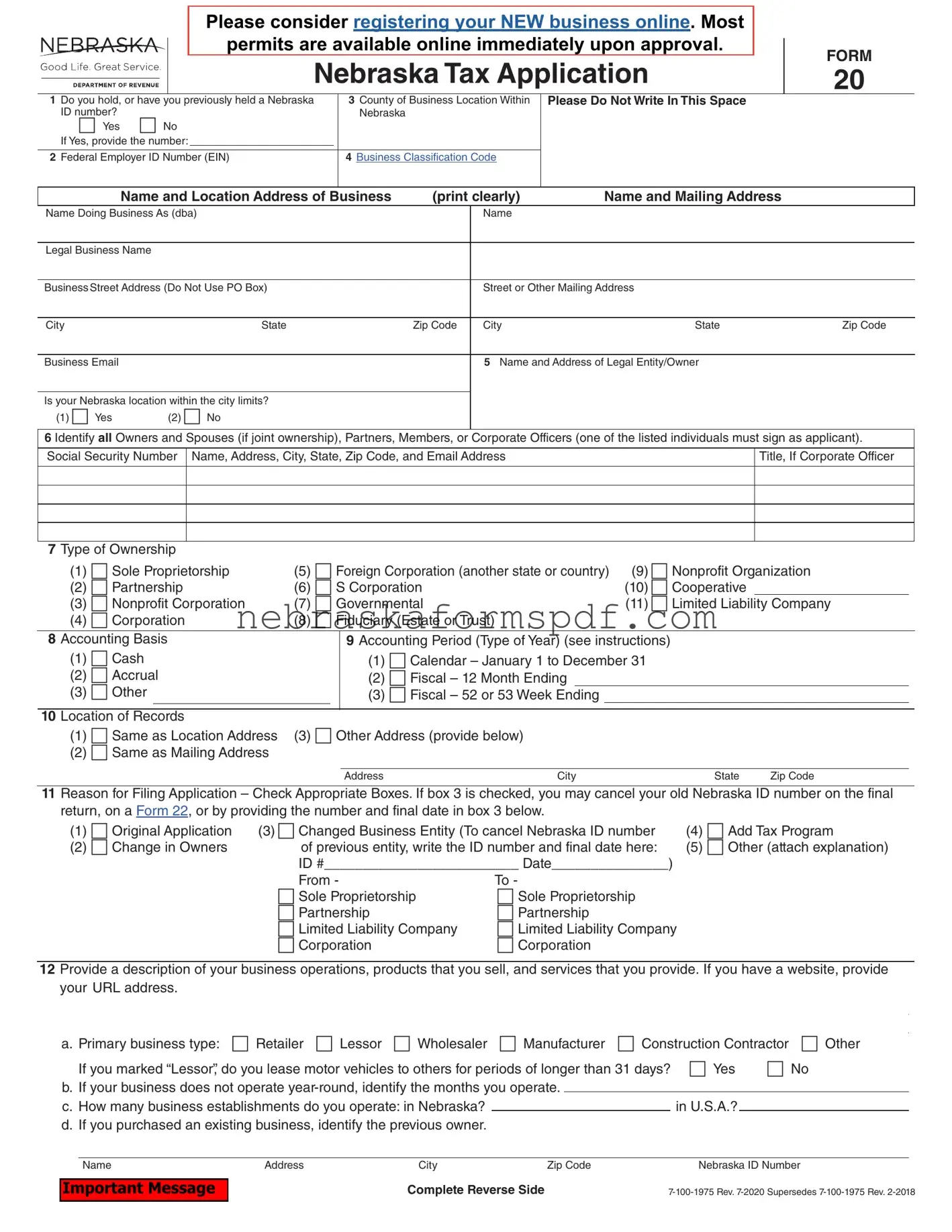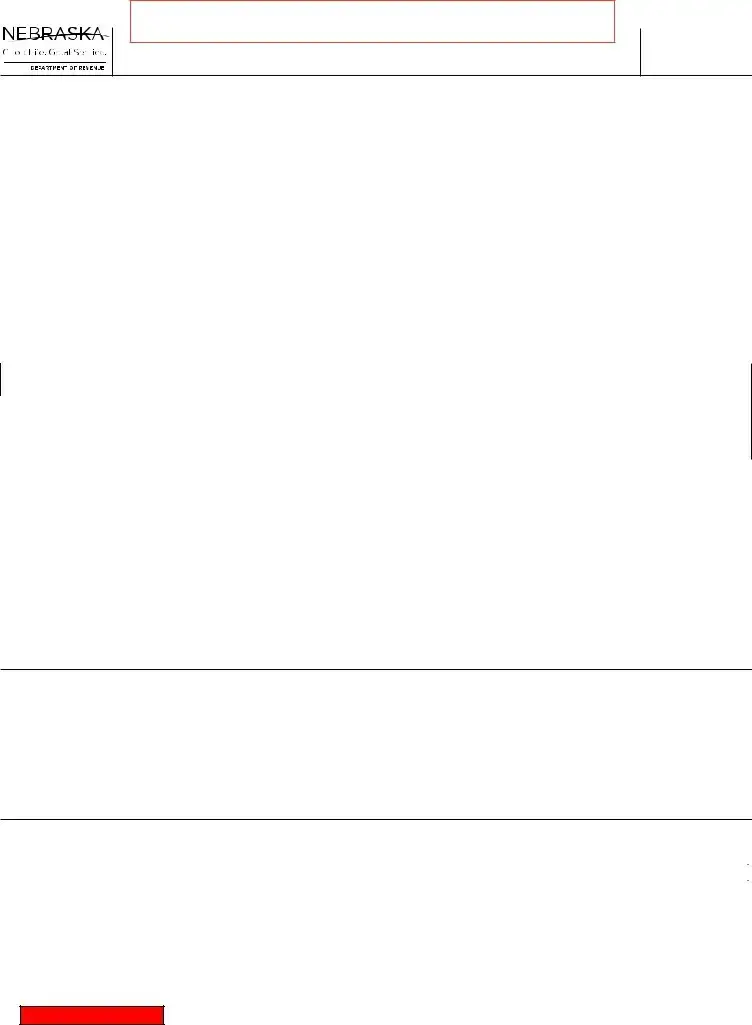and other payments that are subject to federal income tax withholding are included in the term “wages” and are subject to Nebraska income tax withholding. Income tax withholding may also be required for certain construction contractors who are not registered on the Contractor Registration Database at dol.nebraska.gov. Nebraska income tax must also be withheld on pension and annuity payments which are subject to federal income tax withholding.
Corporation Income Tax. Every business entity subject to federal corporate income tax with Nebraska source income must file a Nebraska Corporation Income Tax Return, Form 1120N. Insurance companies and certain nonprofit organizations filing Federal Forms 990-T, 1120H, or 1120POL, must also file Form 1120N. Corporations and limited liability companies with Nebraska source income which have elected to file under Subchapter S of the Internal Revenue Code must file a Nebraska S Corporation Income Tax Return, Form 1120-SN.
Partnership Income Tax. The Nebraska Partnership Return of Income, Form 1065N, must be filed by every partnership with
Nebraska source income. Form 1065N must also be filed by an LLC which is treated as a partnership for federal income tax purposes and which derives income from Nebraska sources.
Fiduciary Income Tax. Every fiduciary of a resident estate or trust must file a Nebraska Fiduciary Income Tax Return, Form 1041N, if the estate or trust is required to file a federal income tax return for the taxable year. A fiduciary return is not required for a simple trust if all of the trust’s beneficiaries are residents of Nebraska, all of the trust’s income is derived from sources in Nebraska, and the trust has no federal taxable income.
Financial Institution Tax. Every financial institution which maintains a permanent place of business in Nebraska and actively solicits deposits from Nebraska residents must file a Nebraska Financial Institution Tax Return, Form 1120NF. A financial institution does not file a Nebraska Corporation Income Tax Return.
Miscellaneous Tax Programs
Tire Fee. Retailers selling new tires for a motor vehicle, trailer, semitrailer, or farm tractor must obtain a tire fee permit. Only one permit is issued regardless of the number of locations selling new tires (see Nebraska Tire Fee Information Guide).
Lodging Tax. Any person operating a hotel, motel, inn, campground, bed and breakfast, or other lodging facility in Nebraska must obtain a lodging tax permit for each location. The location address and the county of business location given on this application must be the actual physical location of the lodging facility, not a management company or office location (see Nebraska and Local Taxes on Lodging Information Guide and GIL 1-19-1 Short-term Rental Licensing, filing, Tax Base, and Collection Responsibilities for Lodging and Sales Taxes). An MMP must obtain both a sales tax permit and a lodging tax permit and collect and remit the sales and lodging taxes for all sales they facilitate. The short-term rental owner, referred to as “Host” is also required to be licensed for sales and lodging taxes.
Litter Fee. Manufacturers, wholesalers, and retailers having annual gross proceeds of $100,000 or more from sales in this state of products subject to the litter fee must obtain a litter fee license for each place of business. Manufacturers, wholesalers, or retailers with more than one location must license each location and file a combined litter fee return and report the total gross proceeds for all locations. A Nebraska Combined Filing Application, Form 11, must be filed to obtain a combined litter fee number (see Nebraska Litter Fee Information Guide).
Severance and Conservation Tax. Every person severing oil or natural gas from the soil of Nebraska must be registered and pay the severance and conservation tax, unless the oil or gas is sold in Nebraska, and then the first purchaser must pay the tax.
Nebraska Prepaid Wireless Surcharge. Every person making taxable sales of prepaid wireless telecommunications services, including sales of prepaid mobile phones and phone cards, and recharging prepaid phones and cards, must be registered to collect the Nebraska Prepaid Wireless Surcharge.
Each of the following programs has a separate application form, as indicated. These application forms are all available on DOR’s website.
Cigarette and Tobacco Products
To obtain a Cigarette Wholesale Dealer’s Stamping License, Directory License, Tobacco Products License, License to Transport Unstamped Cigarettes, or to register as a Cigarette Manufacturer or Distributor, you must file a Nebraska Cigarette and Tobacco Products License and Registration Application, Form 20CT.
Mechanical Amusement Device
Operators and distributors of mechanical amusement devices that are used for a game, contest, or amusement, must file a Nebraska Tax Application and Return for Mechanical Amusement Device Decals, Form 54.
Bingo, Lottery, Raffle, or Lottery by Pickle Card
To apply for a license to conduct bingo, a lottery by the sale of pickle cards, a lottery with gross proceeds in excess of $1,000, or a raffle with gross proceeds in excess of $5,000, you must file a Nebraska Application for Bingo, Lottery, Raffle, or Lottery by Pickle Card, Form 50.
Motor Fuels Taxes





